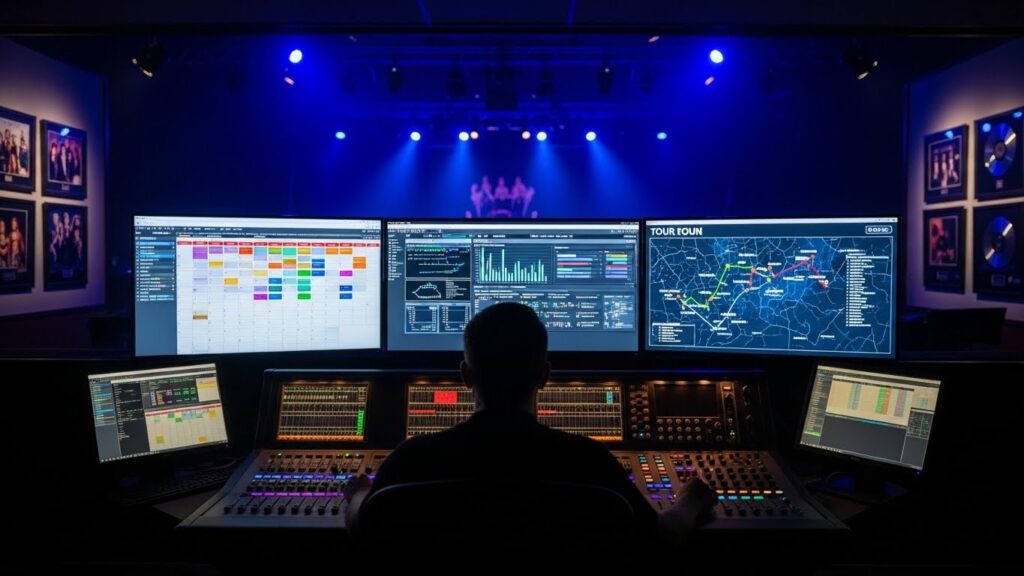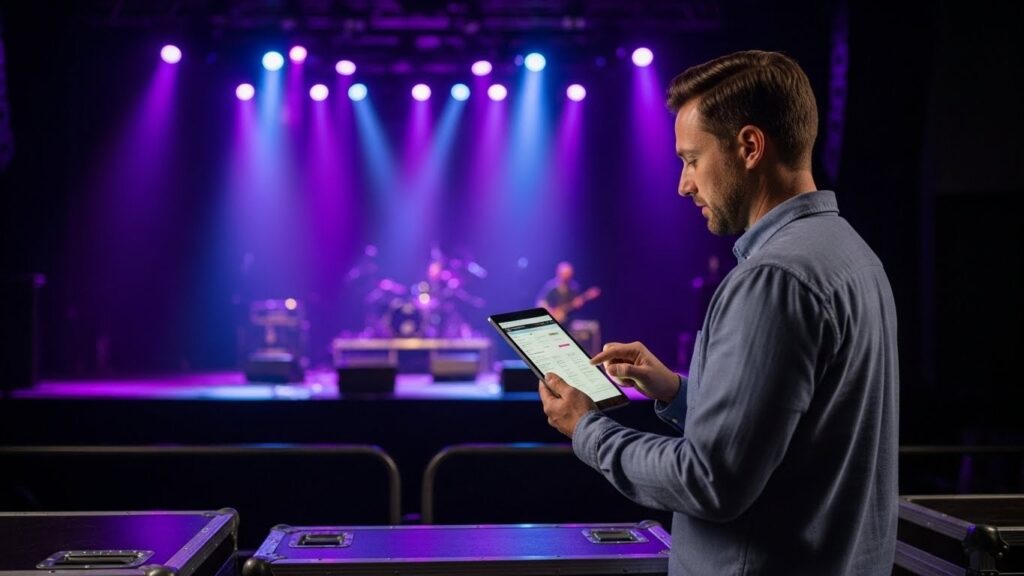
How to Book Bands for a Venue
The Steps to Book Bands for a Venue
Do you want to create the music event of the year? Or maybe you are more focused on bringing fans a consistently good lineup each month. Fans want to live music experiences more than ever, but balancing what fans want and turning a profit is not easy. Too many venues lose money before the concert even starts.
Finding the right artist is one of the most important parts of the process, but it is only the beginning. If you are looking at how to book bands for a venue, there are several steps that will start you on the right path to pleasing your guests and putting money in your pocket.
Start With a Budget
When learning how to book bands for a venue, your first task is to decide on the type of event and work out a budget. Are you booking a festival or a single event? Will you need support acts? Do you need to hire a venue or do you already have one? What will a venue cost?
Add to the venue cost any staff costs required before, during and after the event. This will likely include a technical crew such as lighting and sound engineers, bartenders, door staff, and any other personnel required to ensure your event runs smoothly. Finally, set an advertising budget.
How Far in Advance Should You Book Bands for a Venue?
Once again, booking bands for a venue all depends on the scale and popularity of the band and the type of event. For a local band or a band with a fairly good following, aim to book them around three to four months in advance to allow for plenty of time to arrange any date conflicts, book support bands, and promote the event.
If you are booking top draw acts for a concert or filling in the line up for a festival, you may need to work up to eight months to a year in advance. As you are dealing with more money and financial risk, you should focus on promoting the event well and for a longer period of time.
Payment Using Flat Fees
There are a number of ways you can pay the bands that perform at your gig. However, the standard for most well-known, established bands, is a flat fee. This means agreeing on a lump sum beforehand that the band will receive after playing.
A flat fee attracts bigger bands because it ensures a minimum pay and is paid in advance. Bands at this point will likely already have a fanbase that will fill a venue and are past the point of having to invite friends and family to do so. The flat fee is generally more reliable when it comes to guaranteeing a certain number of ticket sales.
That does not mean you should assume a full house. Use an estimate based on their current following and your own research on conditions around your venue, such as dates and timing alongside other gigs. Some bands may even ask for a flat fee and a cut from ticket sales.
Other Band Payment Structures
When considering how to book bands for a venue, you have other options of paying bands. These can be useful in cases where you are putting on lesser-known local or emerging bands who are building their reputation and fanbase. The most frequently-used payment structure is to give the band a portion of the profit from either entry fees and/or bar sales. This incentivizes the band to help promote and fill the venue.
Of course, not all bands will put in the effort to self-promote and some will book too many shows in one area, diluting the demand. You can end up with an empty venue and a stack of bills. To lessen your risk, put them in a lineup with other bands to diversify the show and pull in a broader audience.
Book Bands for a Venue Using Your Head, Not Your Heart
Despite your love for that hardcore Latvian punk band you saw on YouTube, you need to ask yourself if booking them for your small town venue will draw the necessary crowd to make you money. You have to understand your local audience and the market for particular live music in your area.
If you’re convinced that booking an unknown band is worth the risk, then try adding them to the bill with popular local acts in the same or similar genre. You can introduce them to the audience and help build their fanbase without assuming too much risk.
Making Contact
Now that you know your budget and which talent you believe will attract guests, you can start approaching acts to perform. If you have an act in mind, you will need to find out their fee and check that you can sell enough tickets to cover the cost. Depending on the band, you will either contact the band directly or contact their manager or booking agent. You can usually find contact details on their social media or website.
Begin by discussing your venue as an opportunity for them to reach both existing fans and a potential new audience given the venue’s typical audience.Give them a range of open dates to see whether the act is available. It is important for you to understand any possible guarantees or requests they may have for a show. Once this dialogue is open, you can hopefully reach an arrangement to get them booked.
You will need to provide a contract once you reach an agreement, even when dealing with local bands who you know well. The contract serves as documentation and prevents misunderstandings that can ruin a relationship and cost both parties revenue.
Never rely on a verbal contract, especially if you are selling tickets. For larger bands, you may need to hire an attorney for a tighter, professional agreement. While this incurs additional costs for you, you will be able to reuse it as a standard contract template for other bookings.
Promotion and Selling Tickets
Now that you have the act and the venue, you can start to sell tickets. You need to calculate how many tickets you need to sell to make a profit. The booked acts can help with promotion, but it is ultimately up to you to effectively promote the event. Set your ticket prices appropriately based on the act and venue.
Work with the bands to leverage their methods of promoting gigs and concerts. Ask them to use their mailing lists or social media to share any content. If you have also built up this facet of your business, it can be reciprocal, and you can promote their content and music to create excitement for your event.
Contact local media outlets, such as radio stations, television shows, and podcasts, and provide them with a press pack so they can promote the event on their shows.
You can set aside part of your marketing budget money for paid online promotion. Invest in social media, PPC campaigns, and any outlets that target fans of similar genres and artists in the area of the concert.
The Day of the Concert
It is important to act with professionalism and courtesy on the day of the live performance. Bands, their staff, and booking agents all talk, and making the event an ideal opportunity to build your reputation as a premier venue or talent buyer.
Meet the band as they arrive at the venue, help them with their equipment, and offer them a place to rest, such as a dressing room. If they have merchandise, make sure they have a great spot to sell their goods.
If you have agreed upon accommodations, you may want to show the band to a hotel or apartment to freshen up. If you have agreed upon any food, drink, or items for their rider, make sure you provide exactly what is in their contract.
Next, distribute an information sheet for the band or their manager that includes the name of the venue manager, the sound technicians’ names, all timings (soundcheck, doors open, the start of the concert, load out times), and the number of tickets already sold.
Enjoy the Gig
Now, it’s time to sit back and enjoy the concert – at least in theory. As the person responsible for the event, you’ll likely be running around to check that everything is going to plan, liaising with the other bands, and sorting any number of issues that may occur.
If you want to make the whole process of booking bands for your venue much easier, take a look at our venue management software created by music industry professionals for music industry professionals.

Matt Ford is the founder and CEO of Prism.fm, an Austin-based software company revolutionizing live music event management. With a background in entrepreneurship and a degree from the University of Wisconsin-Madison School of Business, Ford combined his self-taught coding skills with firsthand experience as a concert promoter to address the inefficiencies he observed in the industry. In 2018, he launched Prism.fm, an all-in-one platform designed to streamline operations for venues, promoters, and agencies by replacing cumbersome spreadsheets with integrated tools for booking, financial tracking, and contract management. Under his leadership, Prism.fm has grown significantly, achieving $3 million in annual recurring revenue post-COVID and securing over $15 million in funding . Ford’s commitment to building user-centric solutions has positioned Prism.fm as a trusted partner for over 1,500 venues and promoters worldwide.



